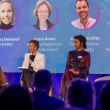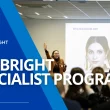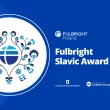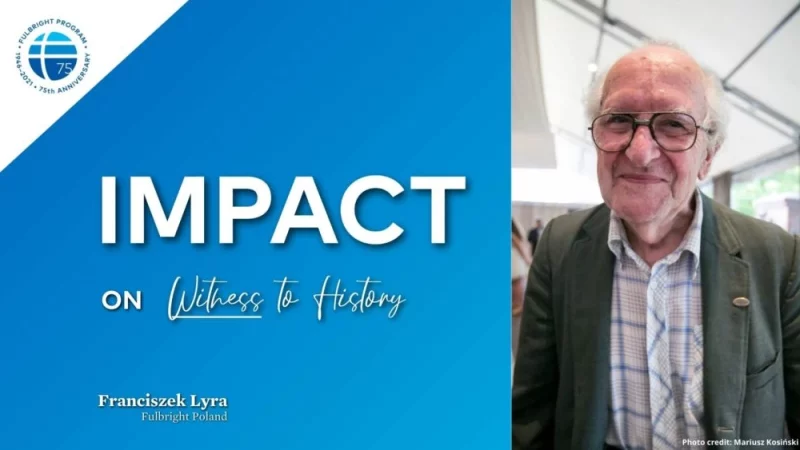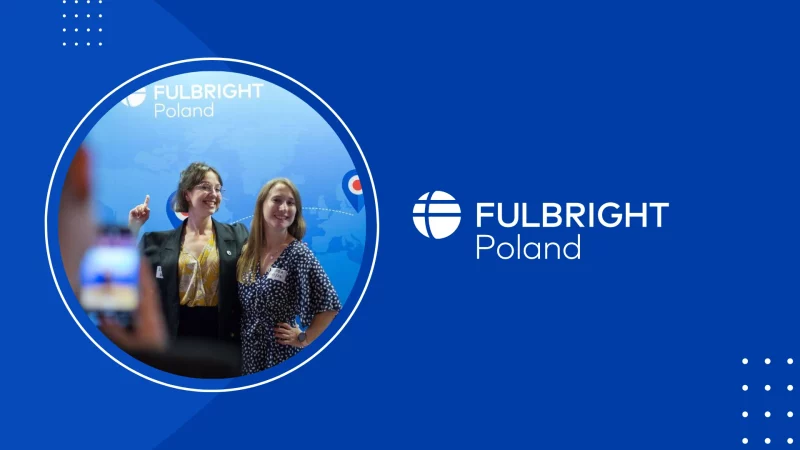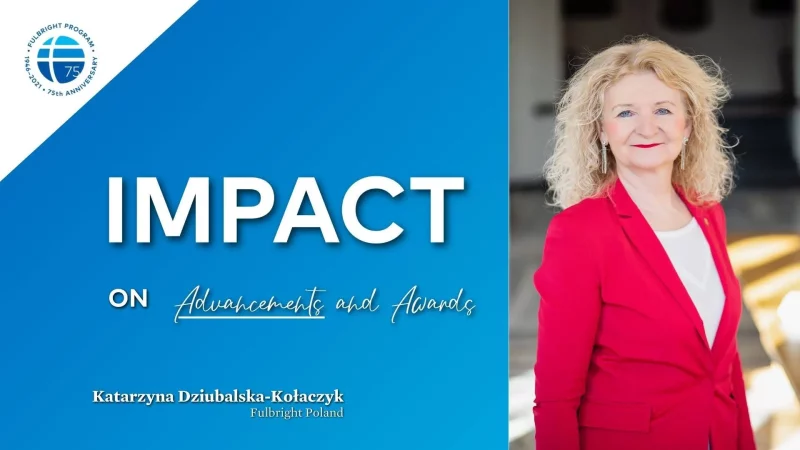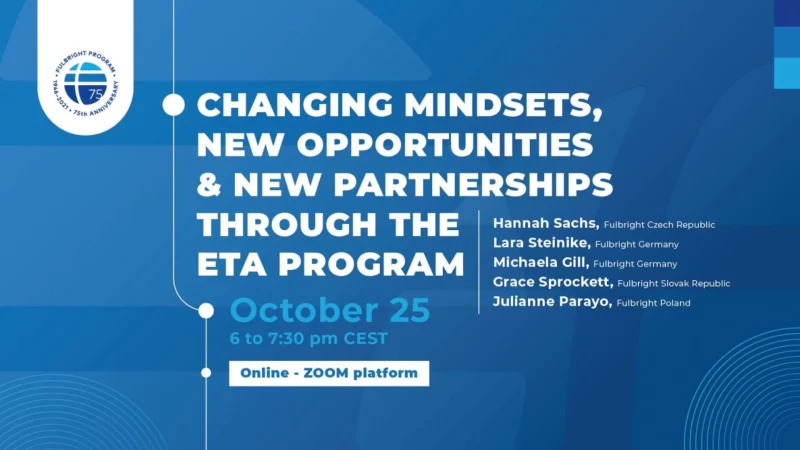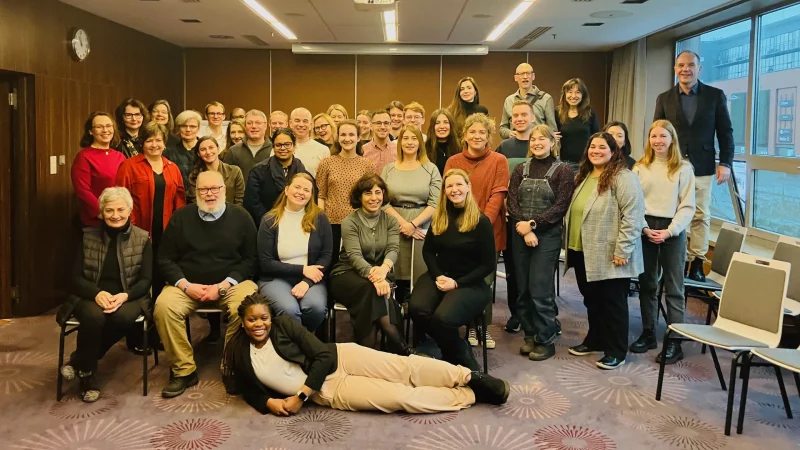In 2021 the Fulbright Program celebrates its 75th anniversary (in Poland, the Program has been present for 62 years). We are joining this celebration by presenting monthly Fulbright alumni stories that showcase the positive impact of the Program on local and global communities. Each of these stories reflects the theme of the month. As part of the August theme “Witness to History,” we are featuring a 2016 interview with the very first Polish Fulbright grantee Dr. Franciszek Lyra (1932-2021) – a renowned author, literary scholar and academic lecturer who started his Fulbright grant at Indiana University, Bloomington in the late 1950s.
Prof. Lyra’s research and his didactic activities have contributed significantly to the development of American Studies in Poland. He was primarily affiliated with the Maria Curie-Skłodowska University in Lublin (where he helped to establish the English Department after returning to Poland from his Fulbright grant) and with the University of Warsaw. For many years, Dr. Lyra had been involved in many activities and initiatives of the Polish Fulbright Alumni Association and the Alumni Association, as well as attended numerous events organized by the Fulbright Commission.
The interview was conducted in 2016 by Fulbright Poland alumna Joanna Socha.
In 1959 you left to start your studies in the U.S. as the very first Fulbright grantee from Poland. You started your program at Indiana University. How did that happen?
Indeed, these were not easy times to start a fellowship in the U.S. The political reality in the late 1950s was inhibited by the excessively exuberant ambitions of young people. But the times of Gomułka are also the times of a sort of political relaxation. Poland has entered into an agreement with the U.S. Department of State to start the Fulbright Program in Poland. It was the first country to do so in Eastern Europe.
I imagine that applying for such a grant looked completely different at the time than it does today. How did you become a candidate and then a laureate?
The decision about who should receive the scholarship was up to the Ministry of Higher Education. They also set certain conditions – the laureate could only be a graduate of the English Department (at the time, in Poland only two universities: University of Warsaw and the Catholic University in Lublin had English departments). I was lucky because when the Ministry asked the English Department at the University of Warsaw to select suitable candidates, I was just finishing my master’s program there. The chair of the department was prof. Margaret Schlauch – an American by birth who helped me a lot.
Did Margaret Schlauch select you for the grant?
Yes. Me and two other candidates. Her decision about who should be taken into consideration was probably impacted by the fact that out of probably 25 students in their final year of studies, only three managed to write their master’s theses on time – at the end of June 1958. I still remember how one day prof. Schlauch called me into her office and said: “You wrote your thesis, passed the exam, I selected you as a candidate for a scholarship.”
How did you react?
I was pleased, but I did not fully understand what it was about. The name Fulbright did not ring any bells at the time. Of course, I was very happy – an American scholarship is a great opportunity, I thought. Why did they choose me in particular? I don’t know. But I had been studying English for five years. Already in my second year there, we presented our achievements to the university officials – today you call them “Curriculum Vitaes.” The university authorities knew that in addition to English, I also knew German, and was learning Russian and Latin. The Ministry of Culture and Art often engaged me as a translator and guide for the foreigners (artists: singers, pianists, writers, delegates of various cultural and educational institutions coming to Poland on various occasions). When I got the scholarship, I was 27 years old.
Why did you choose Indiana University?
After receiving the scholarship, I was called to the U.S. Embassy to see Mr. Yale Richmond – the cultural attaché and author of several books, with whom I am still in touch. He told me that as part of the scholarship, I could only go to state universities. So colleges belonging to the Ivy League, such as Harvard University or Yale, were not an option. Richmond gave me a list of state universities. And then I thought: Which university to choose? So I made the decision by analyzing the map. I chose the state university closest to the US center so that, if the opportunity came, I could visit as many parts of the country as possible. I chose Indiana University. From prof. Schlauch, I knew it was one of the best state universities in America.
What was your vision of the United States before you left?
I come from Silesia. As a child I survived the war there and the news of the death of my beloved uncle in the Dachau concentration camp. More than once, during my studies at the University of Warsaw, on my way home, I used to think about our part of Europe; I dreamed that it would become the “united states.” I dreamed about the United States, but not in the literal sense. I simply associated this country with diversity, with many different ethnic groups, with an amazing history. I dreamed that one day our part of Europe would also be united.
What exactly did the Fulbright grant guarantee for you?
A possibility to study in the U.S. for a year with funding. The scholarship was 150 dollars a month.
Today it is not much…
It might seem so from today’s perspective. But then the value of a dollar was very high. I was paying $110 for the dorm and meals and saving $40 each month.
What surprised you about the way Americans behave when you arrived in the U.S.?
American people were very open-minded and I was making friends with new people very quickly. Already on the plane from New York to Indianapolis, I met a man who turned out to be a professor of English at Indiana University! “Sign up for my classes”, he said! When we landed, he helped me get to Bloomington, which is pretty far away from Indianapolis. This, by the way, is typical of US universities: Many campuses are located at a significant distance from larger cities. The Americans were hospitable. In less than 24 hours, I had already received the first call from a professor I met on the plane who invited me to dinner. In the first months after my arrival in the US, I was invited somewhere almost every day.
Even though you received a Fulbright grant for a year, you managed to extend your stay in the US, eventually earning your PhD at Indiana University. How did it happen?
I was aware that I was only granted the scholarship for a year and I have to do everything I can to make the most out of this time. Above all, I wanted to master the English language perfectly. Prof. Schlauch gave me a letter of recommendation directed to one of the professors of English and Linguistics at Indiana University. This professor immediately took me to the director of linguistics, Fred H. Householder, who asked me if I would like to stay in the US for more than a year. “Haven’t you thought about a doctorate?” he asked. I was completely surprised. Yes, I would attend classes, but I only have the right to stay in the US for a year, I thought. After all, I had no right to do it, I told him. And he said that he and Dowling, the Dean of foreign exchanges, would help me extend my scholarship. I had a year to prepare for exams qualifying me to enter a PhD program. When I met all the requirements, they extended my scholarship. But it was not easy. I had to pass exams in two foreign languages excluding Polish and English. So I passed the exams in German and Russian.
What did you specialize in during your PhD studies?
In the history of linguistics. And my doctoral dissertation was on the problems with bilingualism – “English and Polish in contact” – Polish and English spoken in the US by Americans of Polish descent. I prepared a survey, which I sent out to hundreds of Poles from different cities and small towns. How did I get their contact information? I opened a phone book and was looking for Polish-sounding names. A lot of people responded to my request and I managed to arrange interviews with many of them. One of the main stages of my research included several trips to Chicago – a city with the largest Polish community in the U.S. I traveled to Chicago in an old Ford bought for $100. Gas was really cheap back then, just imagine 4 liters cost 17 cents! I started traveling across the U.S.: not only to visit Polish communities, but various places all around the country.
What was your most interesting experience during your stay in the U.S. on a Fulbright grant?
One day, I got a letter from the Department of State. The envelope contained a plane ticket to Washington, D.C. and an invitation to meet President Kennedy on the occasion of International Student Day. Thirteen students from various countries were invited to participate in this event.
You have experienced many amazing moments in the U.S. After graduation, however, you decided to come back to Poland. Why?
Yale Richmond from the U.S. Embassy in Poland told me something very important before I left – that the future of the Fulbright program in Poland will depend on me. “If you stay in the States, the program will end,” he said. I felt I had to go back home. Besides, I got a very interesting offer in Poland.
Was it about establishing an English Department at the University of Maria Curie-Skłodowska (UMCS) in Lublin?
Yes. After obtaining my doctoral degree and returning to Poland in 1962, I helped to establish an English Department at UMCS.
Why did you decide to go to Lublin?
When I was studying at Indiana University, the Provost of UMCS came to campus. We established a good relationship. Even back then, he suggested that I should come back to Poland and help create English studies at a Polish university. And so I did.
How did your further professional career develop?
I was in Lublin until 1969. Then, I came back to the U.S. where I researched American culture as part of a 2-year fellowship at Harvard. After returning to Poland, the State Publishing Institute asked me to write a book on American literature. I agreed. It was to be published by the Ossolineum Press. Due to the paper shortage, the book is still on my shelf at home. Please remember that these were the seventies, years of a deep crisis. The last time I was in the US was briefly in 2011 at the invitation of Indiana University. Now I am teaching at the American Studies Center at the University of Warsaw, although I am no longer full-time because of my age.
More and more Poles decide to study in the US seeing the unique opportunities in the American higher education system. I myself had a chance to study at a renowned university thanks to the Fulbright grant. A while ago, however, as part of a mentoring program for high school students, I talked to young people about the possibility of studying in the US and they raised numerous concerns. Many said that they were afraid to apply to the best universities because they were afraid of failure. What would you, as the first Polish Fulbright grantee, say to these young people?
I would say that it never hurts to try. You have nothing to lose. And you can gain a lot from trying, even if you don’t get what you dream about immediately. Keep trying, don’t be afraid, you are young, there is a lot ahead of you. The Fulbright program gave me great opportunities, one of the most valuable of which is the chance to meet amazing people from all over the world; for example, until the last day of April this year [2016], I was in touch with prof. Daniel Aaron, considered to be the first Americanist in the world, who passed away at the age of 103. In the 1962-63 academic year, Aaron was the first American Fulbright grantee in Poland, at the University of Warsaw. On the occasion of the 40th anniversary of the Fulbright Program in Poland, on October 21, 1999, together with prof. Aaron, I had the honor of unveiling the plaque of J. William Fulbright in the main hall of the University of Warsaw Library, where it remains until today.


